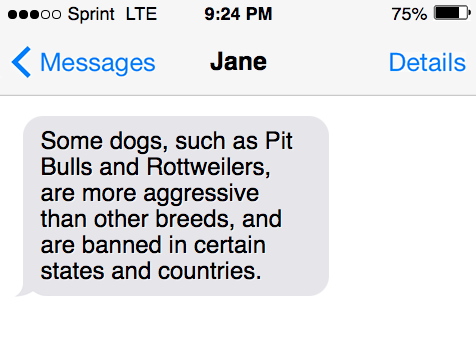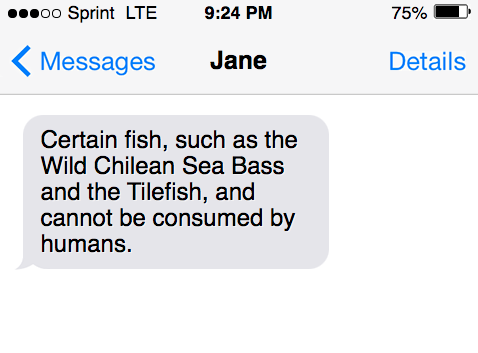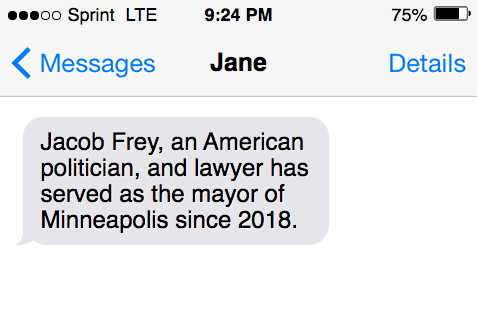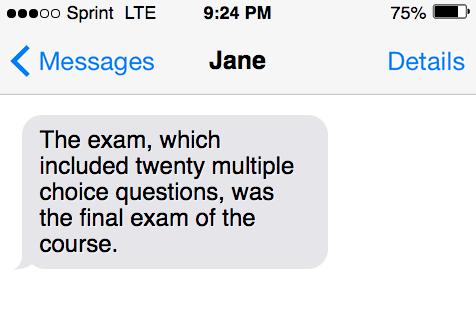When is it correct grammar to put a comma before “such as?”
Commas are probably the most frequently misused punctuation mark in English, and it’s easy to see why. They can be a complicated and tricky form of punctuation to get right!
Learn exactly when and where to use a comma before the common phrase “such as” in a sentence, and become a better writer in no time…
When to use a comma before “such as”
Question: When should there be a comma before the phrase “such as” in a sentence?
Answer:
Include a comma before “such as” when it’s part of a nonrestrictive clause.
Do not put a comma before “such as” when it is part of a restrictive clause or essential phrase of the sentence.

What are nonrestrictive clauses?
A nonrestrictive clause, which can also be referred to as a non-defining relative clause or nonessential clause, adds information to sentences without changing the overall meaning of the sentence.
When nonrestrictive clauses are used in a sentence, they are easy to identify because removing them does not change the sentence meaning. Take a look at the sentence below as an example:
Example: St. Paul, which is the state capital, is the second largest city in the state of Minnesota.
See in the first example above that the nonrestrictive clause, ‘which is the state capital,‘ can be removed from the sentence without changing the meaning of the sentence:
Example:St. Paul is the second largest city in the state of Minnesota.
The second sentence still makes sense even though the nonrestrictive clause has been omitted. This is an easy trick to identify and distinguish between restrictive and nonrestrictive phrases.
Nonrestrictive clauses typically use commas both before and after they are used in a sentence so they set off the information within the commas, (and indicate to readers that they are a non-essential part of the sentence).

This application of the comma helps signify to readers that the clause is nonessential; and that the extra information included lives within the parameters of the two commas that enclose the nonrestrictive clause.
Restrictive phrase vs. nonrestrictive phrase
Nonrestrictive phrases use commas, and are contrasted by restrictive clauses or phrases.
A restrictive clause includes information that is essential to the sentence meaning. A restrictive phrase or essential clause cannot be removed from the sentence without changing or distorting the overall sentence meaning.

SEE the following sentence as an example:
Example: Sports such as skiing and snowboarding are my favorite winter activities.
Now, to take the above sentence and remove the restrictive clause would no longer make sense. Take a look:
Example: Sports skiing and snowboarding are my favorite winter activities.
The second example and sentence does not make sense, and is not grammatically correct.
The restrictive statement such as works to define, modify or introduce information that is necessary to the clause itself. By removing it, the sentence is incomprehensible and simply incorrect.
Restrictive clauses restrict the information presented in the sentence to apply only to the sentence subjects and nouns themselves.
These types of clauses are also more common in writing, and again, they do not need to include a comma.

See the sentences below that illustrate restrictive clauses and phrases in various forms of application:
Examples of sentences that do not need a comma before such as
Do not include commas in the following cases:
1. Sports such as skiing and snowboarding are my favorite winter activities.
- Psychology looks at parts of the mind such as the subconscious and unconscious.
- Sam had never been the kind to take risks such as this.
- There are a few exceptional buildings of architecture, such as the CN Tower, the Space Needle and the Burj Khalifa.
- In the popular literature of Spain, he holds a place such as has no parallel in other countries.
What is the meaning of such as?
The term “such as” shares the same meaning with the word like, as well, and includes or including.
Such as is used more commonly in formal and professional writing; such as an essay or academic articles. The word like is an informal word that should be avoided in formal writing, (for the most part.)
Similarly, most sentences that use phrases like, as well or as well as, are considered more formal and used in various technical and professional writing settings.
According to Merriam-Webster, the phrase “such as” is technically an idiom that’ used, —used “to introduce an example or series of examples.” Idioms in the English language are expressions that captures their meaning from the combination of various words and phrases.
In casual conversation, like talking to a friend or in text, phrases like “such as” are rarely used, and most people choose the colloquial term like in its place.

When to use a comma before a nonrestrictive phrase
- Some dogs, such as Pit Bulls and Rottweilers, are more aggressive than other breeds, and are banned in certain states and countries.
- Certain fish, such as the Wild Chilean Sea Bass and the Tilefish, and cannot be consumed by humans.
- The students, who had enrolled in the prerequisite course, received higher grades.
- Jacob Frey, an American politician, and lawyer has served as the mayor of Minneapolis since 2018.
- I would like to thank my supervisor, Professor Smith, for all his support throughout my degree.
- My mother, who was born in Brazil, is celebrating her 65th birthday this month.
- The exam, which included twenty multiple choice questions, was the final exam of the course.
When to use a comma after such as
The same rules apply after “such as” as they do before the phrase. To offset or frame non-restrictives, such sentences need a comma after “such as.” See the correct use in the following sentence:
Example: Twin cities, such as St. Paul and Minneapolis, are cities that are nearby and in close proximity to one another.
See in the first sentence how commas are applied to ‘frame,’ or include information that is not required to make the sentence logical.
This tells us that the sentence is using a restrictive clause and that it needs commas.
What do the style guides say about using a comma before “such as?”
Most style guides and manuals will agree and endorse the usage of commas that have been explained in this article.
The Chicago Manual of Style, for example, concedes that since nonrestrictive’s include nonessential or parenthetical information, they need a comma before such as.
Similarly, most other style guides and manuals would agree that the use of commas are needed before (and sometimes after), the term “such as” in a sentence.

What are other comma rules?
There are eight general comma rules to follow in English grammar:
- Use a comma when conjoining two independent clauses with a coordinating conjunction (such as FANBOYS, learn all about this mnemonic here).
- Use a comma after introductory clauses or introductory phrases,
- Use a comma to separate items in a series,
- Use commas to frame an appositive or nearby noun phrases,
- Use commas to directly address various speakers in a sentence, (or writing in general).
- Direct quotations are sometimes framed by the use of commas, (though not always).
- Use commas to separate nonrestrictive clauses. Example: Biology, which is a field in scientific study, looks at the scientific study of life.
Check out these other grammar lessons!
Is there a comma before while? When does the word “while” have a comma before it?
What’s an Oxford comma (serial comma)? When is it necessary to use, and when not to use it?
Curious to know whether it’s fullproof, full proof or fullproof? What about beckon call or beck and call? Learn the difference and master the art of English prose.
In Review
As a quick summary of the article:
GAMMAR rules:
- Use a comma before “such as” when it is part of a nonrestrictive clause.
- Do not use a comma before “such as” when it is part of a restrictive clause or an essential part of the sentence structure.
Glossary
- What are nonrestrictive clauses: https://prowritingaid.com/such-as-comma
- What are restrictive clauses: https://www.pristineword.com/comma-before-such-as/
Sources
Inside this article
Fact checked:
Content is rigorously reviewed by a team of qualified and experienced fact checkers. Fact checkers review articles for factual accuracy, relevance, and timeliness. Learn more.
Core lessons
Glossary
- Abstract Noun
- Accusative Case
- Anecdote
- Antonym
- Active Sentence
- Adverb
- Adjective
- Allegory
- Alliteration
- Adjective Clause
- Adjective Phrase
- Ampersand
- Anastrophe
- Adverbial Clause
- Appositive Phrase
- Clause
- Compound Adjective
- Complex Sentence
- Compound Words
- Compound Predicate
- Common Noun
- Comparative Adjective
- Comparative and Superlative
- Compound Noun
- Compound Subject
- Compound Sentence
- Copular Verb
- Collective Noun
- Colloquialism
- Conciseness
- Consonance
- Conditional
- Concrete Noun
- Conjunction
- Conjugation
- Conditional Sentence
- Comma Splice
- Correlative Conjunction
- Coordinating Conjunction
- Coordinate Adjective
- Cumulative Adjective
- Dative Case
- Determiner
- Declarative Sentence
- Declarative Statement
- Direct Object Pronoun
- Direct Object
- Diction
- Diphthong
- Dangling Modifier
- Demonstrative Pronoun
- Demonstrative Adjective
- Direct Characterization
- Definite Article
- Doublespeak
- False Dilemma Fallacy
- Future Perfect Progressive
- Future Simple
- Future Perfect Continuous
- Future Perfect
- First Conditional
- Irregular Adjective
- Irregular Verb
- Imperative Sentence
- Indefinite Article
- Intransitive Verb
- Introductory Phrase
- Indefinite Pronoun
- Indirect Characterization
- Interrogative Sentence
- Intensive Pronoun
- Inanimate Object
- Indefinite Tense
- Infinitive Phrase
- Interjection
- Intensifier
- Infinitive
- Indicative Mood
- Participle
- Parallelism
- Prepositional Phrase
- Past Simple Tense
- Past Continuous Tense
- Past Perfect Tense
- Past Progressive Tense
- Present Simple Tense
- Present Perfect Tense
- Personal Pronoun
- Personification
- Persuasive Writing
- Parallel Structure
- Phrasal Verb
- Predicate Adjective
- Predicate Nominative
- Phonetic Language
- Plural Noun
- Punctuation
- Punctuation Marks
- Preposition
- Preposition of Place
- Parts of Speech
- Possessive Adjective
- Possessive Determiner
- Possessive Case
- Possessive Noun
- Proper Adjective
- Proper Noun
- Present Participle
- Prefix
- Predicate



